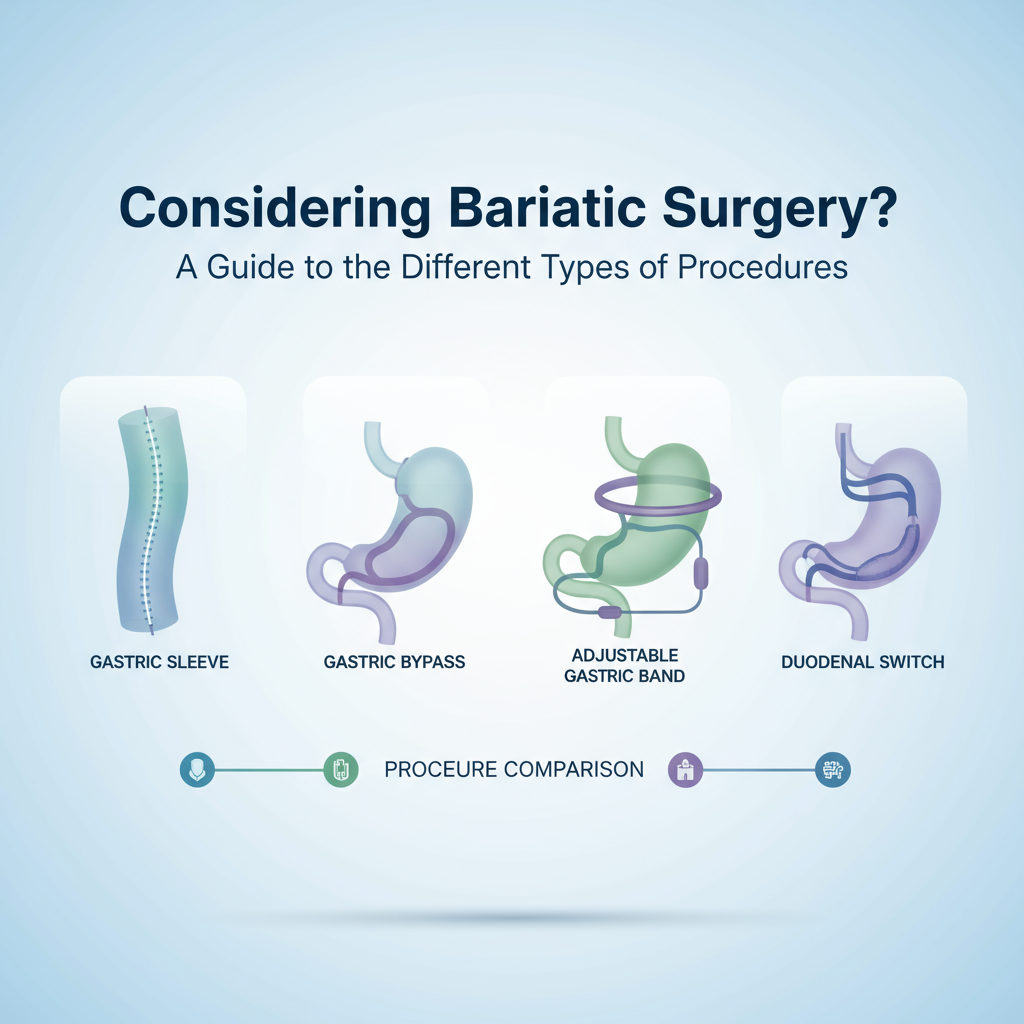For people who’ve had bariatric surgery and are now navigating the long game—this is for you. You’ve worked hard, lost a significant amount of weight, and now the real questions kick in: How do I keep it off years later? What happens if my hunger creeps back, my labs dip, or life gets messy (holidays, stress, travel) and the healthy habits go sideways? Our bariatric team supports long-term success with evidence-based nutrition, exercise, and follow-up care—think practical plans, smart monitoring, and timely adjustments—so you’re not white-knuckling weight loss maintenance alone.
What does long-term success after bariatric surgery look like?
Success isn’t just “scale goes down.” It’s sustainable health. And, frankly, life feeling lighter.
- Weight: maintaining at least 50% excess weight loss 2+ years after surgery (many patients hold 60% or more).
- Metabolic health: A1c at or below 6.5% if you had diabetes, triglycerides under 150 mg/dL, HDL up, LDL down.
- Blood pressure: around 120–129/70–79 mmHg without stacking new meds.
- Waist: under 40 inches (men) or 35 inches (women) is a strong non-scale marker.
- Quality of life: energy for work, family, and hobbies—without food dominating your day.
In my experience, people who define success by health markers + habits (not just pounds) stay consistent longer. Because it’s bigger than the number.
How do you maintain weight loss after bariatric surgery?
Short answer: structure beats willpower. So you automate the right moves and remove friction for the wrong ones.
Daily non-negotiables that work
- Protein: 90 grams per day (front-load 30 grams by 10 a.m.).
- Hydration: 64 ounces of water or unsweetened fluids—sip, don’t chug.
- Fiber: 25 grams per day from veggies, beans, chia, or psyllium (as tolerated).
- Movement: 8,000 steps—yes, your watch counts.
- Sleep: 7.5 hours—protects hunger hormones and recovery.
- Tracking: 2 minutes to log meals or check a habit streak, just enough to stay honest.
Weekly habits that keep weight steady
- Strength training: 3 sessions (full-body) to protect lean mass—muscle is your calorie sink.
- Cardio: 150 minutes moderate or 75 minutes vigorous, your pick.
- Meal prep: 90 minutes on Sunday—protein cook-up, chopped veg, ready-to-go snacks.
- Weigh-in: same scale, same day, same time—once weekly.
- Support: 1 group meeting or coaching touchpoint—accountability changes outcomes.
So here’s the thing about maintenance: it’s less about perfection and more about “reset quickly.” A rough weekend doesn’t become a rough month if Monday has a plan.
What should I eat years after bariatric surgery?
Think “post-bariatric nutrition” that’s protein-forward, high-volume from plants, and low in liquid calories.
- Meals: 3 structured meals + 1 protein snack, no grazing.
- Plate guide: 50% lean protein, 30% non-starchy veggies, 20% slow carbs (quinoa, beans, berries).
- Eating rhythm: chew thoroughly, 20 minutes per meal, stop at “satisfied.”
- Fluids: no drinking 30 minutes before or after meals—protect satiety.
- Carbs: aim for high-fiber carbs paired with protein; ditch “slider foods” (chips, crackers, ice cream).
- Sugar and alcohol: keep both minimal—fast absorption, fast hunger rebound.
Sample day (simple, not boring):
- Breakfast: 1 Greek yogurt cup + 2 tablespoons chia + ½ cup berries (30g protein).
- Lunch: 5 ounces grilled chicken, mixed greens, avocado, vinaigrette (35g protein).
- Snack: 1 protein shake (25g protein).
- Dinner: 4 ounces salmon, roasted broccoli, ½ cup quinoa (35g protein).
I’ve noticed people do best when their first and last meals are “locked-in” defaults—decision fatigue is real.
How much exercise after bariatric surgery supports long-term results?
For weight loss maintenance, volume matters—but so does muscle. You’ll want both.
- Cardio: 150 minutes moderate (fast walk/cycle) or 75 minutes vigorous (run/HIIT).
- Strength: 3 days per week—squats, hinges, pushes, pulls, carries. 8–12 reps, 2–3 sets.
- NEAT: hit 8,000–10,000 steps on busy days by anchoring walks to existing routines (post-meal strolls).
- Progression: add 1 set or 5 pounds every 14 days—small wins, big compounding.
And if you’re coming back from a lull, start with 10-minute “exercise snacks” sprinkled across the day. Zero shame, just momentum.
How do you prevent or reverse weight regain years later?
Regain happens. Real talk: it’s common around year 2–5 as hunger hormones normalize and life stress stacks. The fix is strategic, not punitive.
- Run a 14-day reset: 3 meals + 1 shake, 90 grams protein, 25 grams fiber, no liquid calories, no grazing.
- Log for 7 days: identify “trigger windows” (late night, commuting) and patch with planned alternatives.
- Protein at breakfast: hunger stays saner the rest of the day.
- Strength train 3x weekly: regain often tracks muscle loss; build it back.
- Audit meds: some drugs drive weight gain; ask your provider about alternatives.
- Discuss anti-obesity meds: GLP-1s and others can be appropriate adjuncts—supervised, targets set.
- Book a scope if needed: rare, but anatomical issues exist; your surgeon can assess.
I’d argue that a fast feedback loop—data this week, tweak next week—beats “try harder” every time.
What vitamins and labs do I need long-term?
Bariatric surgery long-term health rides on consistent supplementation and lab checks. Don’t cut corners—deficiencies sneak up.
- Daily multivitamin: bariatric-formula providing ~200% DV of key micronutrients.
- Calcium citrate: 1,500 mg per day split into 3 doses of 500 mg (separate from iron).
- Vitamin D3: 3,000 IU daily (adjust to keep 25(OH)D around 40–60 ng/mL).
- Vitamin B12: 500 mcg sublingual daily or 1,000 mcg weekly.
- Iron: 45 mg daily if menstruating or post-bypass/sleeve with low ferritin; take with vitamin C.
- Others as indicated: thiamin, zinc, copper—guided by labs and procedure type.
Lab schedule: 3 months, 6 months, 12 months, then annually. Panels to include CBC, CMP, ferritin, iron/TIBC, B12, folate, vitamin D, thiamin, zinc, copper, PTH, lipids, A1c. If symptoms pop (fatigue, hair loss, numbness), test sooner.
How often should I follow up with my bariatric team?
Think cadence, not crisis.

- Early: 2 weeks, 6 weeks, 3 months, 6 months, 12 months.
- Long-term: annual surgical follow-up + dietitian tune-up every 6–12 months.
- Anytime: if weight bumps 10 pounds above your maintenance zone for 30 days, book a quick reset visit.
If this feels overwhelming, our team can handle it for you—lab ordering, supplement matching, and a realistic habit plan customized to your schedule.
Is alcohol safe after bariatric surgery?
Short answer: be cautious. After surgery, alcohol hits faster and harder—peak levels are higher, and there’s a real risk of addiction transfer.
- Zero alcohol for 12 months—gut and brain adaptation phase.
- After that: at most 1 standard drink on occasion, with food, and never if you’re driving.
- Avoid sugary cocktails; choose spirits with soda water or dry wine, or skip entirely.
Honestly, many long-term success stories choose not to restart alcohol at all. Sleep, hunger, mood—better without it.
Pregnancy after bariatric surgery—what should I know?
Healthy pregnancies are absolutely possible post-surgery, but timing and nutrients matter.
- Wait at least 12–18 months, until weight stabilizes and labs look solid.
- Prenatal plus bariatric supplements: folic acid 800 mcg, iron as directed, vitamin D optimized.
- Protein target: 80 grams daily minimum during pregnancy, individualized by your provider.
- Close monitoring: obstetrics + bariatric + nutrition—team sport.
And yes, we help coordinate care and labs so you’re not playing middleman between clinics.
How many calories per day long-term after bariatric surgery?
Calories vary by height, age, sex, and activity—still, most long-term maintainers land near 1,400–1,800 kcal with 90 grams protein and high fiber. The better metric: hit protein, cap liquid calories at zero, and let appetite plus progress guide the rest.
How should I measure progress beyond the scale?
- Waist circumference: measure at the navel, weekly—track in inches.
- Body composition: DEXA or smart scale trend—once per quarter or annually.
- Performance: 1-mile walk time, push-ups, deadlift or leg press numbers—objective wins.
- Biomarkers: A1c, triglycerides, HDL, blood pressure.
- Non-scale victories: medication reductions, better sleep, mood stability.
Look, progress isn’t linear. But direction is. Keep your compass, not just your map.
Need a plan you can actually follow?
We build practical systems for healthy habits after bariatric surgery—post-bariatric nutrition tailored to your labs, exercise after bariatric surgery that fits your joints and calendar, and coaching that keeps you consistent. If you want the thinking done for you, we’ll set your protein number, design a 3-day strength plan, choose your supplements, order labs, and check in every 30 days so adjustments happen fast. You handle the reps; we handle the roadmap.





